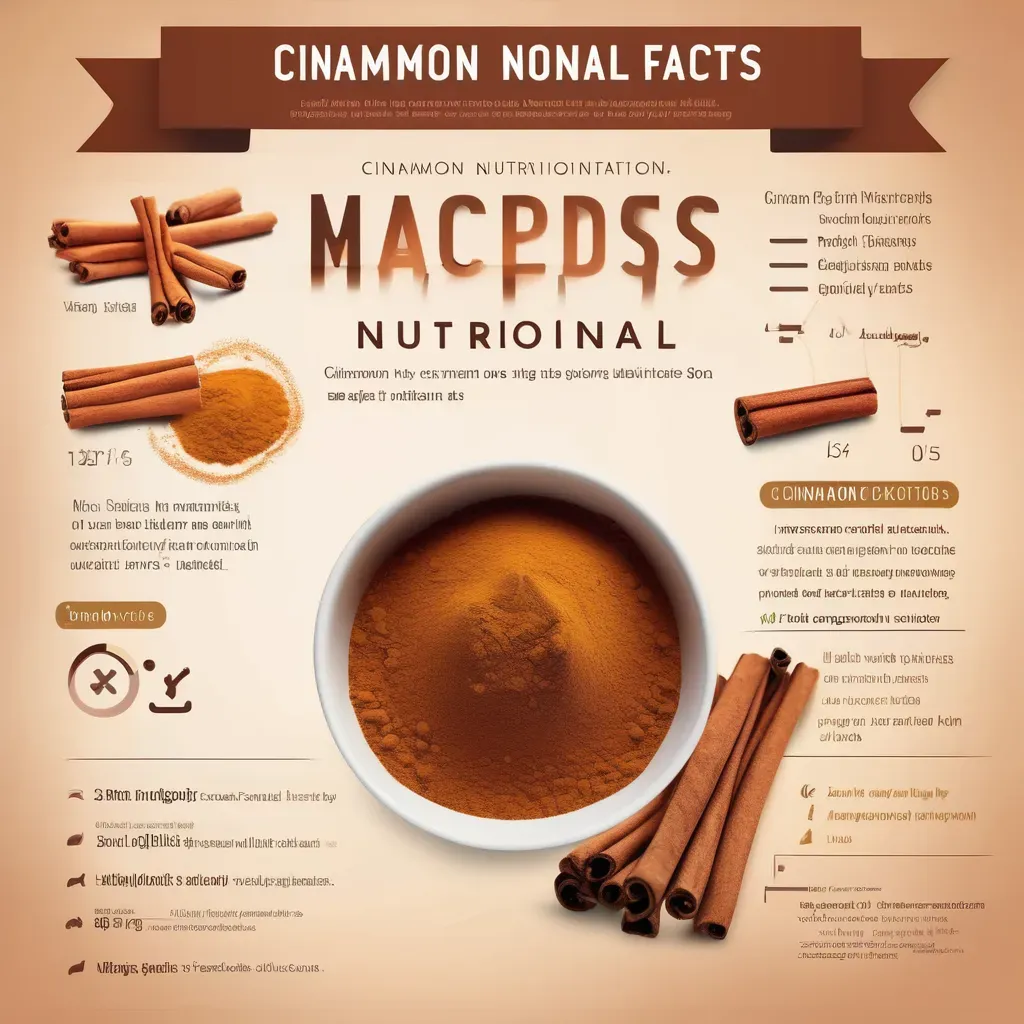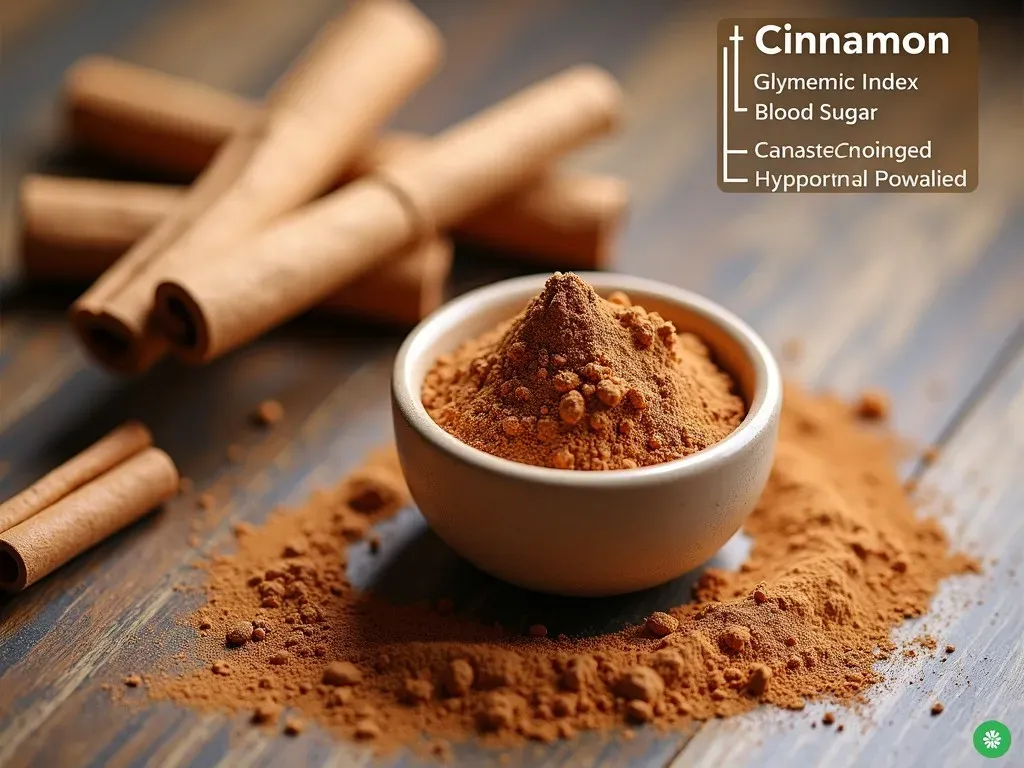The glycemic index (GI) of cinnamon equals 5, which classifies it as a low GI food. The glycemic load (GL) of cinnamon is equal to 2.9, placing it in the low GL category as well. These metrics indicate that cinnamon has a minimal impact on blood sugar levels when consumed. Understanding the effect cinnamon can have on glycemic control is crucial for those managing conditions like diabetes, particularly type 2 diabetes.
The Nutritional Profile of Cinnamon
Cinnamon is not only a flavorful spice but also carries significant health benefits, particularly regarding blood sugar regulation. Here’s a closer look at its nutritional stats (per 100 grams):
| Nutrient | Amount |
|---|---|
| Calories | 261 kcal |
| Carbohydrates | 81.0 g |
| Protein | 4.0 g |
| Fat | 1.2 g |
| Fiber | 53.0 g |
Cinnamon is rich in dietary fiber and contains a unique compound called coumarin, which is responsible for its aromatic qualities and potential health benefits. 
Glycemic Index of Cinnamon
As mentioned, the glycemic index (GI) of cinnamon is just 5. Foods with a GI of 55 or less are classified as low-GI, making cinnamon an excellent addition to a diabetic-friendly diet. The low GI means that cinnamon promotes slow digestion and absorption, resulting in a gradual rise in blood sugar levels.
Benefits of Low-GI Foods
Low-GI foods are essential for maintaining stable blood sugar levels, helping support insulin sensitivity and may even assist with weight management. Here’s a brief look at some benefits:
- Weight Management: Low GI foods can help control appetite and reduce overall energy intake.
- Heart Health: Maintaining steady blood sugar levels is vital for heart health and reducing the risk of cardiovascular disease.
- Improved Energy Levels: Sustained energy from low-GI foods can enhance physical and mental performance throughout the day.
Effects of Cinnamon on Blood Sugar Levels
Research indicates that cinnamon can play a role in lowering blood sugar levels and improving insulin sensitivity. A notable study published in "Healthline" in 2018 highlighted that cinnamon could reduce fasting blood sugar levels by up to 52.2 mg/dL in individuals with type 2 diabetes.
This was further confirmed in various studies where participants who consumed specific amounts of cinnamon showed significant reductions in blood sugar levels:
| Cinnamon Intake (grams) | Decrease in Fasting Blood Sugar (mg/dL) |
|---|---|
| 1 g | 1.51% |
| 3 g | 6.47% |
| 6 g | 8.48% |
How Does Cinnamon Work?
Cinnamon is thought to help in several ways:
- Insulin Sensitivity: It enhances insulin’s effectiveness, allowing more sugar to enter cells and lowering blood sugar levels.
- Antioxidant Properties: Cinnamon is loaded with antioxidants which can protect cells against damage from free radicals.
- Anti-Inflammatory Effects: Chronic inflammation is linked to insulin resistance; cinnamon may help mitigate this.
Competently integrating cinnamon into your daily diet could yield significant benefits for blood sugar management, especially for those on medications like Metformin, commonly prescribed for diabetes management.
Incorporating Cinnamon into Your Diet
Here are some practical tips for adding cinnamon into your meals:
- Morning Oatmeal: Stir a teaspoon into your morning oats or yogurt for added flavor and health benefits.
- Smoothies: Blend cinnamon into protein smoothies for a nutritious boost.
- Baking: Use cinnamon in baking recipes, such as breads and muffins, to infuse sweetness without added sugar.
- Savory Dishes: Add a pinch to savory dishes, such as curries and stews, to enhance flavor.
Recipes to Try
-
Cinnamon Spiced Smoothie
- Ingredients: 1 cup spinach, 1 banana, 1 tsp cinnamon, 1 cup almond milk.
- Blend all ingredients until smooth.
-
Oven-Baked Cinnamon Apples
- Slice apples, sprinkle with cinnamon and a touch of honey, then bake at 350°F for 15 minutes.
Frequently Asked Questions (FAQs)
1. Can cinnamon replace diabetes medication?
Cinnamon should not replace prescribed diabetes medications like Metformin but can complement diabetes management.
2. How much cinnamon should I consume daily?
Most studies suggest 1-6 grams of cinnamon daily for blood sugar control, but it’s best to speak with a healthcare provider for personalized advice.
3. Are there any risks associated with cinnamon consumption?
Excessive consumption of cinnamon can lead to toxicity due to coumarin, particularly in Cassia cinnamon. It is advisable to limit the intake and opt for Ceylon cinnamon when possible to minimize risks.
4. Is the glycemic index of cinnamon affected by how it’s processed or used?
The GI of cinnamon is relatively stable regardless of how it’s consumed; however, combining it with high-GI foods could influence the overall glycemic response.
For more information on the impact of cinnamon on blood sugar levels, visit Healthline.
The understanding of the glycemic index of cinnamon sheds light on its potential role in managing diabetes effectively. With its myriad health benefits, adding cinnamon into your diet can be a flavorful and beneficial choice.

